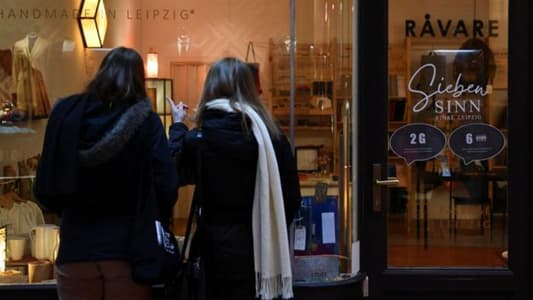Olaf Scholz, who is set to take over as German chancellor next week, supports making vaccination against COVID-19 compulsory and backs barring the unvaccinated from non-essential stores, sources said on Tuesday.
Scholz and outgoing Chancellor Angela Merkel were meeting regional leaders on Tuesday to discuss how to respond to soaring infections in a fourth wave of the pandemic.
According to sources with information about the discussion, Scholz told the meeting he was in favour of a cross-party initiative to make vaccines mandatory, with the hope that it could be put into practice by the end of February.
States ruled by the opposition conservatives also want agreement to close bars and nightclubs and also limit meetings of the unvaccinated to a maximum of five people from two households, according to draft proposals obtained by Reuters.
However, sources close to Scholz's Social Democrats, have said they do not expect any concrete decisions at Tuesday's meeting.
Neighbouring Austria, which like Germany has a relatively low rate of vaccination compared to the rest of western Europe, earlier this month announced plans to make vaccines compulsory as of February.
Scholz is also in favour of making non-essential stores require customers to show proof of vaccination or recovery from COVID-19, the sources said.
Germany has already limited access for unvaccinated people to indoor venues like bars and restaurants and is stepping up booster shots.
The COVID-19 incidence rate has dropped slightly in Germany and Austria and stabilised in the Netherlands since the three countries introduced new measures to curb the spread of the virus in recent weeks, data showed on Tuesday.
Germany's Robert Koch Institute for infectious diseases reported that 452.2 people per 100,000 were infected in the last week, down slightly from 452.4 on Monday. It was the first decline since early November.
Despite this, the number of new daily cases rose slightly on Tuesday compared to last week to 45,753, and another 388 deaths were recorded - the highest daily figure since early March. That bought the overall death toll to 101,344.
Austria reported 8,186 new infections on Tuesday. The incidence per 100,000 was at 936, down from a peak of 1,107 on Nov. 22.
The Netherlands reported 21,443 new cases on Monday as new infections roughly stabilised at record levels in the past week, with testing facilities reaching maximum capacity.
However, hospital admissions are still rising in all three countries.
Germany's Constitutional Court ruled on Tuesday that earlier lockdown measures did not violate children's rights to schooling or other constitutional freedoms, giving the government a freer hand in deciding measures.






TWEET YOUR COMMENT